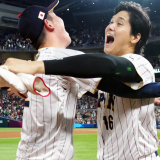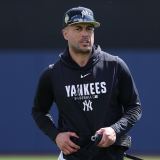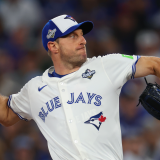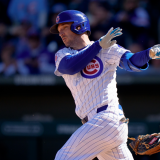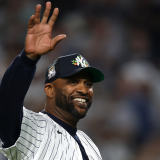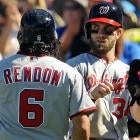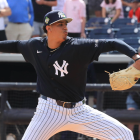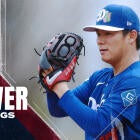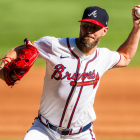Dodgers-Nationals Game 3: Final score, things to know about Nats' 2-1 NLDS lead
After dropping Game 1, the Nationals have taken a 2-1 series lead

The Washington Nationals dropped Game 1 of the best-of-five NLDS to the Los Angeles Dodgers on Friday, but now have won a pair in a row and have a 2-1 series lead, putting the Dodgers one game away from elimination. In Game 3 on Monday, the Nats beat the Dodgers, 8-3, in a game that was actually very close for almost the entire game.
Here are 10 things to know ...
1. A big home run again propelled the Nationals
In Game 2 on Sunday, Jose Lobaton's unlikely three-run homer was the difference. In Game 3 on Monday, Anthony Rendon -- he wasn't unlikely, as he's got good power -- clubbed a two-run shot to give the Nationals a 4-1 lead. They would never look back.

2. Starting pitchers keep getting bounced early
In Game 1 on Friday, aces Clayton Kershaw and Max Scherzer didn't have their most dominant stuff. Kershaw only lasted five innings, needing 101 pitches to get through those. Scherzer only went six, giving up four runs on five hits.
Next up, two very capable starters in Tanner Roark and Rich Hill. Both of them lasted 4 1/3 innings before being yanked. Hill gave up the aforementioned three-run homer and overall gave up four runs on six hits. Roark gave up seven hits and three walks.
In Game 3, Kenta Maeda of the Dodgers only went three innings before handing the ball to Pedro Baez. Gio Gonzalez got one out in the fifth before hitting the showers after the third 4 1/3-inning outing of the series.
So both bullpens have been doing some heavy lifting and there's a game on a third-consecutive game on Tuesday.
3. L.A.'s woes against lefties continued
We've spent a significant amount of time and energy discussing that the Dodgers are brutal against left-handed pitchers. Sure enough, once Gonzalez (a lefty) was pulled, Nationals manager Dusty Baker used two more lefties to get into the seventh.
Thanks to a two-run, pinch-hit home run, the line doesn't look nearly as awful as things seemed for the Dodgers offense most of the game. They had consecutive hits just one time all game. They had more than one hit in just one inning. They had multiple baserunners in an inning twice. More than 2/3 of this came with a southpaw on the mound.
Absent a barrage of home runs or an amazing pitching performance, it's pretty hard to win that way.
4. Carlos Ruiz did something pretty rare
The pinch-hit homer we just mentioned came by the man we so lovingly call Chooch. The backup catcher was summoned by Dodgers manager Dave Roberts to pinch hit with a runner on in the fifth inning and cut the lead to one with a 3-1 swing.
Ruiz joins a fun list of Dodgers players to hit a pinch-hit home run in the postseason:
George Shuba, 1953 World Series Game 1
Chuck Essegian, 1959 World Series Game 2
Chuck Essegian, 1959 World Series Game 6
Jay Johnstone, 1981 World Series Game 4
Kirk Gibson, 1988 World Series Game 1
Orlando Hudson, 2009 NLCS Game 5
Obviously it would have been a bigger deal had it been a shot that put the Dodgers in the lead, such as Gibby's iconic blast, but it's still worthy of a quick glance.
5. The Dodgers held down Daniel Murphy and it still didn't matter
In last year's NLDS loss to the Mets, the Dodgers saw Murphy hit .333 with a double, three homers and five RBI. Through two games in this series, Murphy was 4 for 6 (.667) with a pair of RBI singles. There might have been some nightmares over the thought of Murphy stepping into the box during the Dodgers' cross-country flight on Sunday.
In Game 3, they actually kept him quiet, as he went 0 f0r 4, leaving four runners on base. He did walk, but he didn't personally do any damage with his bat.
As noted in the handy subhead above, though, it didn't matter. The rest of the Nationals 1-6 hitters all collected at least one hit apiece, with Jayson Werth going 3 for 4 with a double, home run and two RBI, Bryce Harper gathering an RBI single, Rendon hitting the aforementioned two-run home run and Ryan Zimmerman going 2 for 4 with a big two-RBI double in the ninth.
Werth's homer, by the way, was off the Dodgers' electric closer, Kenley Jansen, and it was utterly crushed. It started what ended up a four-run ninth to make the close game into a blowout.
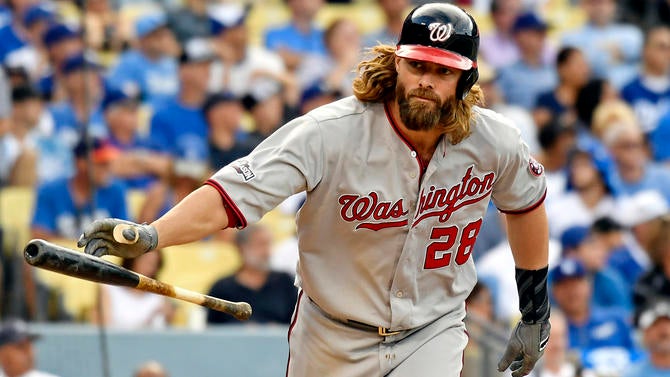
6. Nationals had two unsung bullpen heroes
We'll mostly notice the closer getting things done because it's the last few outs of the game and the "save" stat gives him all the glory. Two relievers had a major impact in this one for Washington, though. Lefty Sammy Solis had already logged 2 1/3 scoreless innings this series and in Game 3, he took over in a one-run game for Gonzalez and worked 1 2/3 scoreless innings.
Then Shawn Kelley -- a righty, mind you -- would work 1 2/3 spotless innings and strike out three to get the lead to closer Mark Melancon.
7. The pace of this game was painfully slow
The game took more than four hours. That's outrageous in and of itself, but considering it wasn't a wildly high-scoring affair -- at least until the ninth -- and only lasted nine innings, it's pretty surprising, too. There were lots of pitching changes, but it's also how long the pitchers take between pitches.
Take Dodgers reliever Pedro Baez. He had a good outing, going two scoreless frames to pick up for Maeda's bad outing. He also took ages to throw each pitch. This isn't a surprise, as he averaged 30.2 seconds per pitch this season, the longest in the majors (Fangraphs.com).
Commissioner Rob Manfred often talks about ways to shorten the game. A pitch clock might be coming, as it's been tested in lower levels of play.
8. It's big decision time for Dave Roberts
With their backs against the wall, do the Dodgers bring Kershaw back on short rest? He was great last season in the same situation, getting the Dodgers to Game 5 (though Zack Greinke would lose it). He was also injured for a significant chunk of the second half due to back issues and wasn't great in Game 1.
If Kershaw doesn't get the nod, it'll be 20-year-old lefty Julio Urias. He's never pitched in the postseason before. He generally hasn't come across as the type to shrink from big moments but we can't know how he'll fare until he gets to the mound. For what it's worth -- I'd say very little, but some might disagree -- he was knocked around in each of the first two starts of his big-league career.
If Roberts does elect to go with Kershaw and the Dodgers win, he's then left with either Rich Hill on short rest or Urias in Game 5. Urias hasn't pitched since Sept. 29 and hasn't thrown at least five innings since Sept. 7.
9. The Nationals have never been further than this
Since moving to D.C., this franchise has only been to the playoffs twice (2012 and 2014) and each time it was bounced in the NLDS. In 2012, they were able to tie the series, 2-2, before blowing Game 5. So this is actually the best shape the franchise has ever been in the postseason since the move, being one win away and not having their own backs against the wall.
So they'll look to put the Dodgers away in Game 4 and advance to the NLCS for the first time in Nationals history.
10. The Dodgers face yet another early exit
Right through the middle of Clayton Kershaw's prime, the Dodgers have made the playoffs four straight years as the NL West champion. The first time around, they made the NLCS before losing. In 2014 and 2015, they were bounced in the NLDS round and now they face that possibility for the third-straight season. Given the roster and the payroll, that shouldn't really be acceptable. Former manager Don Mattingly became the scapegoat last offseason and first-year manager Dave Roberts won't suffer the same fate, but this would be quite the disappointing finish.
Still, they have the chance to win two straight and advance. It's definitely not over.


